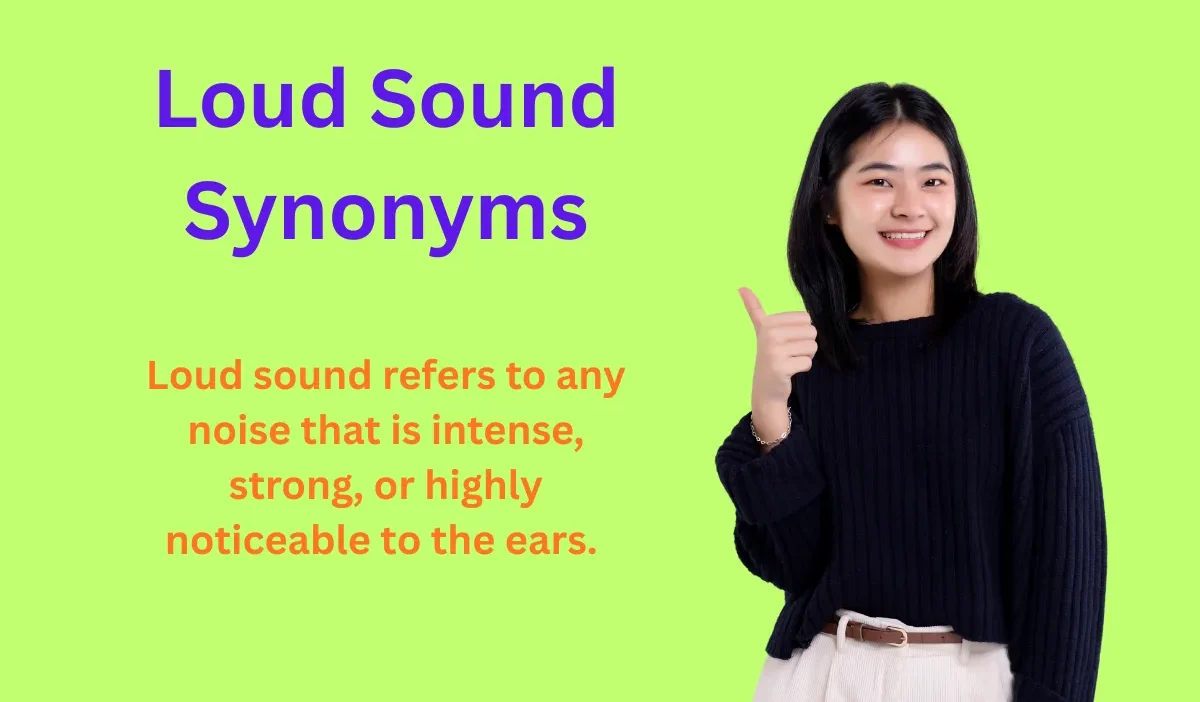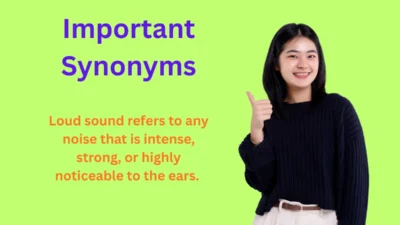Loud sound synonyms, such as booming, blaring, thundering, and deafening, capture different aspects of intensity, volume, and impact. For example, booming emphasizes deep, resonant noise, while blaring highlights sharp, attention-grabbing sound. These words convey varying shades of power, urgency, and auditory effect, helping writers, storytellers, and content creators describe loud sound with precision and nuance.
If you’re writing about music, daily life, social media, or descriptive storytelling, choosing the right synonym lets you strike the perfect tone—dramatic, humorous, or neutral. In this guide, we’ll explore multiple ways to describe loud sound and when each term fits best.
These synonyms of loud sound not only enrich your expression but also help you navigate context, mood, and audience perception. From literary descriptions to internet culture, the word reflects energy, attention, and auditory impact.
What Does Loud Sound Mean?
Loud sound refers to any noise that is intense, strong, or highly noticeable to the ears. It can range from natural phenomena like thunder to human-made sounds like sirens, concerts, or machinery. Loud sounds often grab attention, trigger reactions, or set a mood in storytelling.
The term “loud sound” can describe:
- An event or object producing high-volume noise
- A signal or alert that demands immediate attention
- A dramatic or humorous effect in writing or conversation
Loud sound isn’t just a descriptor—it conveys energy, urgency, and presence.
Synonyms & Related Words for Loud Sound (1–30)
1. Booming
Meaning: Deep, resonant, powerful sound
Example: “The booming bass shook the entire room.”
Use when: Emphasizing depth and intensity, often in music or dramatic events.
2. Blaring
Meaning: Harsh, loud, and attention-grabbing noise
Example: “The car alarm was blaring all night.”
Use when: Highlighting sharpness or disruption.
3. Thundering
Meaning: Loud and powerful, like thunder
Example: “The crowd’s cheers created a thundering roar.”
Use when: Conveying overwhelming volume or drama.
4. Deafening
Meaning: Extremely loud, almost unbearable
Example: “The fireworks were deafening from across the park.”
Use when: Stressing intensity.
5. Ear-Splitting
Meaning: So loud it causes discomfort
Example: “The siren emitted an ear-splitting wail.”
Use when: Describing sharp or irritating noise.
6. Resonant
Meaning: Deep, full, and vibrating sound
Example: “Her voice had a resonant quality that filled the hall.”
Use when: Emphasizing richness or presence.
7. Raucous
Meaning: Loud, harsh, and disorderly
Example: “The party became raucous as the music turned up.”
Use when: Highlighting noisy or chaotic environments.
8. Clamorous
Meaning: Persistently loud and insistent
Example: “The protesters were clamorous in their demands.”
Use when: Focusing on ongoing, demanding noise.
9. Roaring
Meaning: Loud and continuous, like an engine or lion
Example: “The engines were roaring as the plane took off.”
Use when: Conveying power and motion.
10. Piercing
Meaning: Extremely high-pitched and loud
Example: “The alarm emitted a piercing shriek.”
Use when: Emphasizing sharpness and attention.
11. Thunderous
Meaning: Overwhelmingly loud like thunder
Example: “The applause was thunderous after the speech.”
Use when: Dramatic effect in crowds or events.
12. Blustering
Meaning: Loud, aggressive, or forceful sound
Example: “The wind was blustering against the windows.”
Use when: Describing natural or forceful noise.
13. Clanging
Meaning: Sharp metallic sound
Example: “The pots were clanging in the kitchen.”
Use when: Highlighting metallic, abrupt noises.
14. Clattering
Meaning: Continuous loud noise of hard objects
Example: “Dishes were clattering on the floor.”
Use when: Describing mess, chaos, or activity.
15. Howling
Meaning: Loud, wailing noise
Example: “The wolves were howling in the distance.”
Use when: Natural or emotional sounds.
16. Bellowing
Meaning: Loud, deep shouting or roaring
Example: “The coach was bellowing instructions from the sidelines.”
Use when: Expressing authority, anger, or drama.
17. Clamor
Meaning: A loud uproar or continuous noise
Example: “The marketplace was filled with clamor.”
Use when: Collective or chaotic sound.
18. Explosive
Meaning: Sudden, very loud sound
Example: “The fireworks went off with an explosive bang.”
Use when: Highlighting intensity and surprise.
19. Vibrant
Meaning: Loud and full of life
Example: “The music was vibrant and energizing.”
Use when: Positive, energetic sound quality.
20. Screeching
Meaning: High-pitched, harsh noise
Example: “The brakes were screeching on the bus.”
Use when: Conveying irritation or danger.
21. Tumultuous
Meaning: Loud and disorderly
Example: “The celebration was tumultuous and wild.”
Use when: Crowds, chaos, or excitement.
22. Clanging
Meaning: Loud metallic hitting sound
Example: “Chains were clanging in the factory.”
Use when: Industrial or abrupt noises.
23. Boisterous
Meaning: Loud and energetic
Example: “The children were boisterous on the playground.”
Use when: Playful or lively environments.
24. Shrill
Meaning: High-pitched, piercing, unpleasantly loud
Example: “Her shrill laughter echoed through the hall.”
Use when: Annoying or sharp sounds.
25. Resounding
Meaning: Clear, loud, echoing sound
Example: “The resounding cheers lasted for minutes.”
Use when: Highlighting impact or importance.
26. Explosive
Meaning: Forceful and sudden sound
Example: “The engine roared with explosive power.”
Use when: Emphasizing sudden intensity.
27. Piercing
Meaning: Extremely sharp and loud
Example: “The whistle was piercing across the stadium.”
Use when: Commanding attention.
28. Rumbling
Meaning: Continuous deep sound
Example: “Thunder was rumbling in the distance.”
Use when: Nature or machinery.
29. Thunderclap
Meaning: Sudden, loud crash like thunder
Example: “A thunderclap startled everyone in the park.”
Use when: Dramatic, surprising effect.
30. Resounding
Meaning: Loud and clear
Example: “The resounding applause filled the theater.”
Use when: Positive or impactful sound.
Choosing the Right Synonym
When selecting a synonym for loud sound, consider:
- Tone: Do you want it to sound dramatic (thundering, roaring), irritating (ear-splitting, shrill), or rich (resonant, booming)?
- Context: Music, natural phenomena, machinery, or social situations may need different words.
- Intensity: Choose deafening or booming for extreme volume; resonant or raucous for moderate loudness.
- Formality: Literary or journalistic writing fits with resonant, thunderous, or clamorous; casual blogs or memes can freely use blaring or roaring.
Conclusion
Loud sound is more than just volume—it conveys emotion, energy, and attention. Its synonyms, from booming to shrill, allow you to match tone, context, and intensity precisely. Whether describing natural events, music, machinery, or daily life, each word captures a unique dimension of auditory experience.
By understanding nuance, context, and intensity, you can choose the perfect synonym for a loud sound, making your writing vivid, engaging, and precise.



